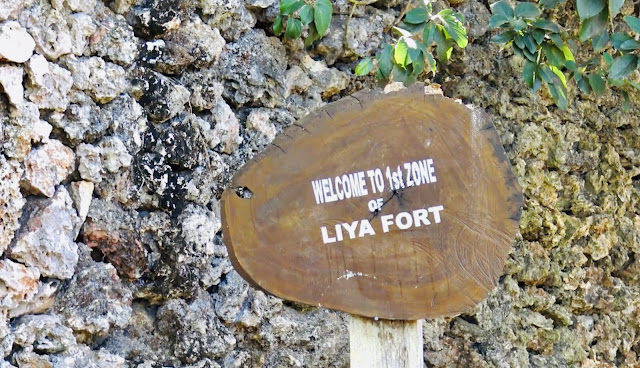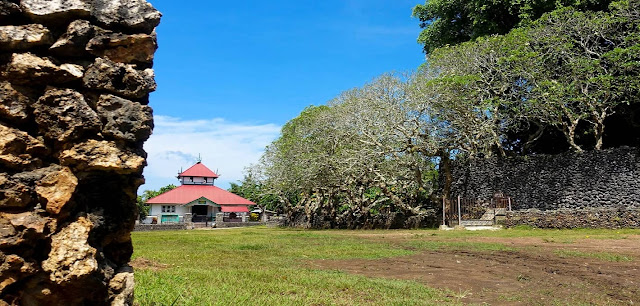The Liya Togo Village, and historical Fort site, is a fascinating destination for various reasons. It provides a unique glimpse into culture and history within a picturesque highland village. The Liya Togs Fort stands out as the largest fort in Wakatobi, renowned as a significant historical landmark not only in Wanci-Wanci but also across Indonesia. Constructed using local coral, egg whites, and lime dough, the fort and mosque have remarkably stood the test of time despite their traditional building methods.
Exploring the area alongside Michelle and Jeff from the catamaran Seahorse, we discovered their shared passion for textiles. For Karen and Michelle, this trip was highly anticipated, while Jeff and Rob were excited about the renowned seafood lunch that Michelle and Jeff had recommended.
 |
| Our feet dangling over the water at the Seafood Restaurant. The food was superb. |
After a 30-minute drive from Wanci, we reached Liya Village, where indigenous Liya women warmly welcomed us, dressing us in traditional sarongs. It was interesting to observe the diverse ways the sarong was worn at each location we visited, showcasing the versatility of this single piece of cloth. However, we must admit that this particular style of wearing the sarong was not the most flattering.
Our initial stroll led us to rows of ancient frangipani trees that have stood for a century, bordering the northern edge of a small field and providing shade to the historical graveyard where notable figures from Libya's past rest.
This field is a significant site known as a Buluara, where in the 14th century during the empire, King Liya and his nobles would convene to discuss and make important decisions. The wall enclosing the area features worn seats where these influential individuals would gather. Additionally, the field served as a training ground for soldiers honing their skills before heading into battle.
Towards the east lies a mosque, constructed at the same time as the fort, dating back many centuries. Though we did not enter due to differing beliefs.
On the southern side stands a weathered pile of rocks known as Tugu Liya, translating to "small hole." Legend has it that a lost boy discovered a ray of light emanating from this spot while searching for an exit from an underground cave through a small hole. So here lays the monument to that fable.
To the west of the field stands an open timber structure called a Baruga, where indigenous elders of Liya would gather for meetings. The upper floor was reserved for nobility, the middle for the middle class, and the lower level for common folk. We were graciously welcomed into the Baruga to try a traditional drink – a delightful tamarind juice made from the wild tamarind fruit abundant in the village.
After an enlightening tour of the fort's historic grounds and enjoying delicious Tamarind juice, we embarked on a stroll through the village. Our journey began by passing through the impressive gatehouses of the fort, marveling at the depth of the wall structure. As we wandered the village streets, we observed the locals carrying out their daily tasks. This village, though occasionally visited by tourists, maintains an authentic atmosphere without being a typical tourist destination. The residents are genuinely welcoming but focused on their daily routines.
Our main interest was witnessing the creation of hand-woven sarongs, especially for Karen, who has a passion for textiles. It didn't take long before we encountered a woman weaving, passing down family designs from one generation to the next.
Without pattern books, each sarong may vary in color but maintains the same design. Learning to weave a sarong is a significant skill for young women before marriage. Besides intricate weaving, artisans also craft mats, bags, and baskets from pandanus leaves.
Meanwhile, fishermen diligently repair their nets, skillfully weaving lines back and forth. The village seems to operate to its own rhythm, echoing the shuttle's movements during weaving.
If you would like to see our moving pictures of our visit to Liya Village and the Fort you can find the link ▶️ https://tinyurl.com/DreamtimeSailEp91
Thanks for catching our latest Blog, cheers R&K
You maybe interested in the following 🔽
We found paradise but we may never leave as our anchor is stuck solid. You can watch it here. 👉 http://tinyurl.com/DreamtimeSailEp87
If you are travelling to Indonesia by boat you maybe interested in the following guides.
This interactive Ebook takes from Brisbane to Horn Island without a night passage, discovering beautiful parts of the Queensland coast rarely visited. The EBook supplies all of our tracks and anchorage waypoints, with what anchoring conditions we were in. But it also gives you full details of what to see and do at each remarkable destination.
You can find out more about this EBook here ▶️ https://payhip.com/b/pxLMX
Is this your first time into Indonesia? This amazing country has so much too offer the cruiser. What we can say is sometimes paperwork can be overwhelming. This interactive guide is to help you wade through the
officialdom and come out the other side without tearing your hair out.
You can find out more about this guide here ▶️ https://payhip.com/b/YEeQ7
If you would like to buy all 4 of the above EBooks to help your sailing journey you can at a discount. Because you have read to this far on our blog, as a thank you we say here’s 20% off the bundle price!
So head to our book store ▶️ https://payhip.com/Dreamtimesail
and use this code at checkout ▶️ WOTZCNM6JL






























No comments:
Post a Comment
We love to read your comments regarding our blog, what you enjoyed and what you might like to see more of. Please leave us your thoughts.